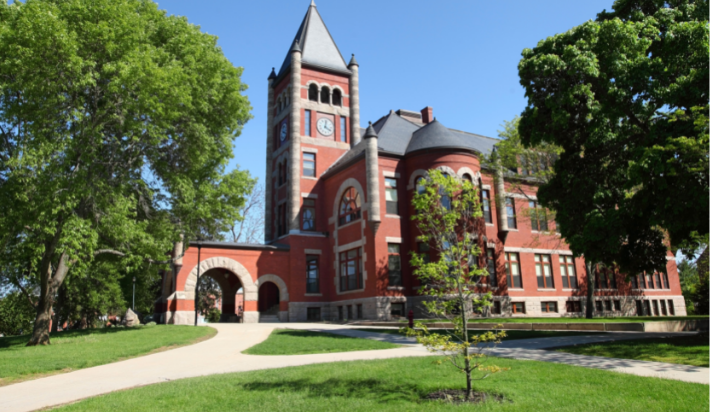“The most creative and most productive workers are the ones who are able to unplug from the office, recover their mental and physical energy, and return to their work recharged.” – Alex Soojung-Kim Pang, author of Rest
Across the country, college campuses are entering a liminal stage. Even if your campus was partially open in Spring 2021, you likely feel the difference of a less inhabited campus.Final grades have been delivered, graduation ceremonies have ended, and students have moved out of residence halls. This is the period where a college campus can feel eerie, even after a pandemic during which the regular hustle and bustle of campus sounds were already softer and lighter.
While the work doesn’t stop for higher ed leaders during this liminal stage, it is a time to reflect, rest, and work on the bigger ideas that don’t get the headspace and time needed when classes are in full swing. When I was head of marketing at the University of Texas at Austin in a previous life, we would celebrate the day after the graduation ceremony: “We finally get time to think!” “Now we get to work on our strategic projects!” “We’ll have three months with no crises!”
My team accomplished its most strategic and important work during the summer, but looking back, I regret not advocating for and making space for more rest and downtime. It’s easy to want to pack those three months with so much because the demands from students and faculty plummet. There’s a natural seasonality built into higher ed that compels leaders to take advantage of the summer months, especially now when enrollment numbers need a lift and blended learning is on the rise.
Last summer (2020) was consumed preparing for a Fall reopening as the pandemic continued to rage. Everyone in higher ed burned the candle at both ends, and by the end of the semester, it was clear burnout was a problem. With the pandemic now getting under control but still top of mind, and the desire to use these months to make headway on important projects, I wanted to share some ideas on what I would do differently if I were still an administrative leader at a university today. These ideas come from a lovely book I just finished: Rest, by Alex Soojung-Kim Pang. He argues that our society has evolved into a culture of burnout and overwork but we would likely get more done if we worked less.
The advice is timely. The last fifteen months have been brutal for all of us. With over half of us who are 18+ years now fully vaccinated, we’re starting to see a return to normal. But what if we did things differently in our quest to return to “normal”? What if we were able to distinguish between hard work and good work, rejecting the “busyness” that seems to be uniquely American. What if, instead, we could embrace rhythms that enable us to work smarter and practice “deliberate rest” to achieve levels of innovation and effectiveness like never before? Let’s explore some of Alex’s ideas.
6 WAYS HIGHER ED LEADERS CAN WORK SMARTER
- Practice deliberate rest. Deliberate rest is work’s partner and support system. Alex writes, “The better you are at resting, the better you will be at working.” When you rest your brain, it creates connections and consolidates information in different and sometimes even better ways than the conscious mind. Replace distractions like Netflix or social media with restful activities that are vigorous and engaging, like Winston Churchill, who took up painting to explore his skills in a restorative way. Alex posits: “Deliberate rest helps you recover from the stresses and exhaustion of the day, allows new experiences and lessons to settle in your memory, and gives your subconscious mind space to keep working…When you learn how to balance work and rest, you can sustain a higher level of productivity and creativity.”
- Begin early and stick to a routine. This idea isn’t original, but it’s so powerful. Early rising can help create a clearer distinction between your work and rest periods and provide greater peace of mind about both. When you get things done first thing in the morning, when there are fewer distractions, you can feel better and more relaxed about stopping work at your designated time. A routine protects your time, your most valuable resource. Morning-focused work with periods of deliberate rest creates rhythms that stimulate innovation and creativity, nudging inspiration instead of commanding it to appear. Alex writes, “When your habit is to work steadily [and rest steadily], a day when you fall behind isn’t fatal.”
- Know when to stop work. This was one of the most fascinating parts of the book that was new to me. It turns out that if you stop working on something when you know what your next action or move will be is better than powering through to the finish. By forcing yourself to stop at a strategic moment, you are more likely to produce worthy work more regularly. The human brain is amazing: When you know you will return to an unfinished piece of work the next day, your subconscious keeps plugging away at its challenges while your conscious mind attends to other things.
- Sleep. This is a no-brainer that so many don’t follow. Some people even brag they do just fine on little sleep. I don’t buy it. Alex reminds us that lack of sleep severely impairs decision-making, leads to a rise in preventable accidents, and makes it more difficult for your body to fight disease. He also reminds us that Winston Churchill never missed his daily nap during WWII. If you struggle in this area, use the time this summer to get your sleep habits back on track.
- Walk! Regular exercise supports innovation and helps maintain cognitive health. If you’re working on campus, take advantage of your beautiful setting to take walking meetings with a colleague or team member. Do phone calls out walking instead of over Zoom/Teams. Or leave your phone on your desk and take a walk with a notebook so that you can jot down ideas that come to you. A walk or run can jump-start the flow of ideas in ways that sitting at your desk cannot.
- Take time away from work. Higher ed loses out when workers don’t take breaks, and burned-out employees can’t care as much about their job. They make more errors, don’t communicate as well with co-workers and customers, and can’t focus on what matters. Take time off for a vacation or staycation and encourage your team members to do so as well. Even a long weekend can be restorative.
At Apogee, we are committed to helping you innovate, and we know the best way to innovate is to free up the time and headspace to do so. By establishing these practices during the liminal phase of Summer 2021, you’re setting up yourself and your team to drive the long-term innovations that your school needs to increase enrollment, focus on student outcomes, and deliver the technologies and IT services that will underpin blended learning modalities and other important pedagogical shifts.





